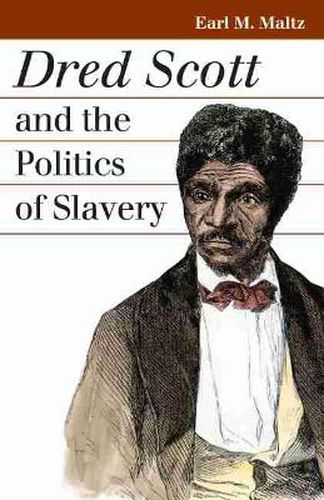Readings Newsletter
Become a Readings Member to make your shopping experience even easier.
Sign in or sign up for free!
You’re not far away from qualifying for FREE standard shipping within Australia
You’ve qualified for FREE standard shipping within Australia
The cart is loading…






The slave Dred Scott claimed that his residence in a free state transformed him into a free man. His lawsuit took many twists and turns before making its way to the Supreme Court in 1856. But when the Court ruled against him, the ruling sent shock waves through the nation and helped lead to civil war. Writing for the 7-to-2 majority, Chief Justice Roger Taney asserted that blacks were not and never could be citizens. Taney also ruled that the Missouri Compromise of 1820 was unconstitutional, upsetting the balance of slave and free states. Earl Maltz now offers a new look at this landmark case, presenting Dred Scott as a turning point in an already contentious national debate. Maltz’s accessible account depicts Dred Scott as both a contributing factor to war and the result of a political climate that had grown so threatening to the South that overturning the Missouri Compromise was considered essential. As the nation continued its rapid expansion, Southerners became progressively more fearful of the free states’ growing political clout. In that light, the ruling from a Court filled with justices sympathetic to the Southern cause, though far from surprising helped light the long fuse that eventually exploded into Civil War. Maltz offers an uncommonly balanced look at the case, taking Southern concerns seriously to cast new light on why proponents of slavery saw things as they did. He presents the arguments of all the parties impartially, tracks the sequence of increasingly strained compromises between pro- and anti-slavery forces, and demonstrates how political and sectional influences infiltrated the legal issues. He then traces the impact of the case on Northern and Southern public opinion, showing how a decision meant to resolve the question of slavery in the territories only aggravated sectional animosity. By presenting a more nuanced picture of the pro-Southern justices on the Court, Maltz offers readers a better understanding of how they came to their opinions, even as they failed to anticipate the impact their decision would have - a miscalculation that to some degree undermined the Court’s power and authority within the American political system. Ultimately, as Maltz suggests, this is a story of judicial failure, one that remains a vital chapter in American law and one that must be mastered by anyone wishing to understand the peculiar nature of our national history.
$9.00 standard shipping within Australia
FREE standard shipping within Australia for orders over $100.00
Express & International shipping calculated at checkout
The slave Dred Scott claimed that his residence in a free state transformed him into a free man. His lawsuit took many twists and turns before making its way to the Supreme Court in 1856. But when the Court ruled against him, the ruling sent shock waves through the nation and helped lead to civil war. Writing for the 7-to-2 majority, Chief Justice Roger Taney asserted that blacks were not and never could be citizens. Taney also ruled that the Missouri Compromise of 1820 was unconstitutional, upsetting the balance of slave and free states. Earl Maltz now offers a new look at this landmark case, presenting Dred Scott as a turning point in an already contentious national debate. Maltz’s accessible account depicts Dred Scott as both a contributing factor to war and the result of a political climate that had grown so threatening to the South that overturning the Missouri Compromise was considered essential. As the nation continued its rapid expansion, Southerners became progressively more fearful of the free states’ growing political clout. In that light, the ruling from a Court filled with justices sympathetic to the Southern cause, though far from surprising helped light the long fuse that eventually exploded into Civil War. Maltz offers an uncommonly balanced look at the case, taking Southern concerns seriously to cast new light on why proponents of slavery saw things as they did. He presents the arguments of all the parties impartially, tracks the sequence of increasingly strained compromises between pro- and anti-slavery forces, and demonstrates how political and sectional influences infiltrated the legal issues. He then traces the impact of the case on Northern and Southern public opinion, showing how a decision meant to resolve the question of slavery in the territories only aggravated sectional animosity. By presenting a more nuanced picture of the pro-Southern justices on the Court, Maltz offers readers a better understanding of how they came to their opinions, even as they failed to anticipate the impact their decision would have - a miscalculation that to some degree undermined the Court’s power and authority within the American political system. Ultimately, as Maltz suggests, this is a story of judicial failure, one that remains a vital chapter in American law and one that must be mastered by anyone wishing to understand the peculiar nature of our national history.